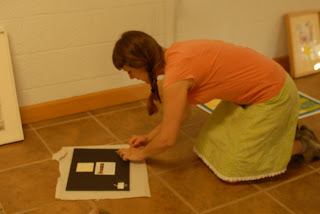I loved the Scottish accents in the audio of our recent book Under the Skin, a dialect familiar from reading Welsh's Trainspotting. Faber's book is about a lot of things including social class, the idea of mercy, the dangers of hitch hiking, and gender roles; but the politics of factory farming is disturbing.
I am writing my blog post on Thanksgiving where the phrase "Happy Thanksgiving" can easily be replaced by"Happy Turkey Day." Many people have a turkey on their table, and most of these turkeys come from factory farms; farms that are, for the most part, unseen by the public.
The unsettling issues around factory farming and where the food we eat comes from in Faber's book remind me of ideas explored in Amber Hansen's 2012 art project A Story of Chickens. Hansen, who grew up on a farm in Iowa, received a Warhol Foundation Rocket Grant for her proposal to house chickens in a traveling coop. At the end of the project the chickens would be eaten at a community gathering. Hansen received hate mail, and as a result of pressure, including an ordinance by the city, ultimately excluded chickens from the project. There were many heated debates around this project; many felt it was cruel to use an animal for the use of art, while others countered that chickens are consumed daily, and the result of the chicken would be the same whether is was displayed in public or not.
______________________________________________________
More on The Story of Chickens; Artist Statement from the Story of Chickens: Blog: " Through this project, I made a commitment to unveil what I have found to be the abstracted and passive experience of our disengagement with the animals we consume. “The Story of Chickens”’ intent is to provide an opportunity for this engagement....
The average American’s interaction with food is at best a passive one. By this I mean that consuming is often reduced to a purely aesthetic experience abstracted from the reality of life and death. I believe our current reliance on factory-farmed animals to be a parasitic relationship. By urging a closer relationship between the consumer and the consumed, I hope to promote a more conscientious and tangible relationship.With this closeness comes the responsibility of realizing and de-abstracting the conditions and origins of that which we choose to consume.
See the blog: http://rocketgrants.org/category/2011-projects/the-story-of-chickens-a-revolution/
Hansen getting ready for the show A Story of Chickens.




